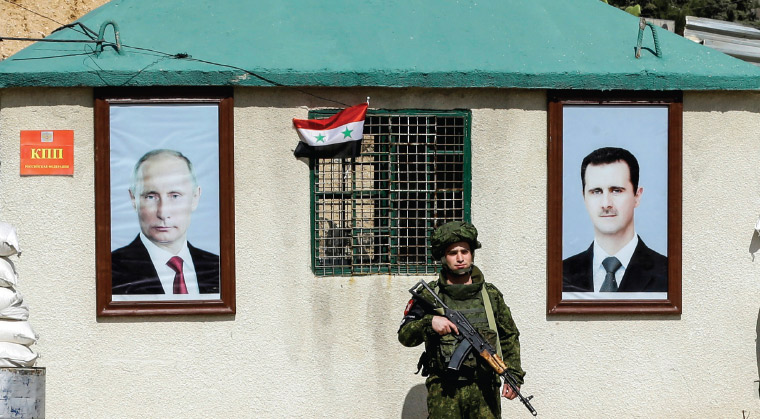Israel and Russia Careening toward Disaster?

As the US goes AWOL on Syria, will Israel end up facing Russia alone?

W
hile the world fixates on a coming clash between Iran and Israel, a potentially more lethal conflict may be brewing with an even more powerful regional power: Russia.
Three senior Israeli officials who have served at the highest levels of the military and intelligence services now say that Israel and Russia may come into direct conflict over Syria.
“The American attack in Syria and the attack on the Iranian base in Syria, attributed to Israel, appear to be separate, but actually, they’re parallel incidents,” says Maj. Gen. (res.) Amos Yadlin, head of the Institute for National Security Studies (INSS) in Tel Aviv, referring to the Western strike on Syria’s chemical weapons facilities on April 14 and Israel’s bombardment of the T4 base near Homs on April 9. “In the last three years, a new, not-so-nice neighbor has moved into the north: Russia. On paper, it’s Bashar al-Assad who’s sitting in his palace and routinely murdering his own people, but really it’s Vladimir Putin who’s pulling the strings.”
Yadlin, who once served as head of the IDF’s military intelligence, said the joint American-British-French strikes last week failed to significantly damage the Assad regime’s chemical weapons capabilities. But the attack, which came despite Russian warnings and objections, is sure to provoke a response from Moscow. “Now on the agenda we have: Russia’s response against the Western coalition; the international community’s continued indifference to the chemical weapons that Assad still has and is continuing to produce; and in the longer term, the impending crisis surrounding the nuclear deal with Iran next month,” Yadlin said.
Former Mossad chief Efraim Halevy also sees the prospect of an Israel-Russia clash. Halevy says that Russia intends to defend its regional ally, Iran, a defense that could put it in direct conflict with Israel. “Russia came to Syria in order to embed itself there, with an eye on the long term,” he says. “Russia is building bases and other capabilities for the coming decades. I don’t think it wants to see the defeat of its central strategic partner in the region, Iran. There could be skirmishes between Israeli and Russian forces, and that could lead to war.”
Halevy’s predecessor at Mossad, Maj. Gen. (res.) Danny Yatom, agrees that Iran could be the precipitator of a Russia-Israel conflict. At a certain point, Yatom says Israel thought it could work with Russia in Syria, but no longer. “Their interests are not on par with ours,” he says. “We thought a good relationship between Netanyahu and Putin could overcome the breach, but we were wrong.”
After Israel’s strike on the T4 base, Iran promised that Israel’s “crimes” would “not remain unanswered.” Yatom says that Israel should take Iran’s threats “with the utmost seriousness. From what I’ve seen, the Iranians don’t make empty threats,” he says. “If we examine Iran’s violent history, we’ll see that they were behind attacks against various Jewish and Israeli facilities.”
Yatom believes a future Israel-Iran war could start as a local incident in the Golan Heights or as a larger skirmish with Hezbollah. And in the next conflict, Yatom says, Israel cannot depend on the United States for help. “They fled the region,” he said. “The attack on [Assad’s chemical weapons facilities] was symbolic, just a drop in the bucket. To make any real change, they’d have to target Assad in his palace.”
Indeed, rather than weaken the ties between Russia and Iran, the joint Western strikes have — for the time being at least — strengthened those ties. As a consequence, Israel’s ability to act in the region has narrowed. On both professional and personal levels, cooperation between Iran and Russia is growing deeper. Sophisticated Russian radar systems now cover every inch of Israel’s airspace. Other systems, albeit not as advanced, are being used by the Syrians or Iranians and in some cases transferred to Hezbollah. Israel must therefore take great care to avoid harming Russian forces in Syria, who sometimes man those systems.
(Excerpted from Mishpacha, Issue 706)
Oops! We could not locate your form.







